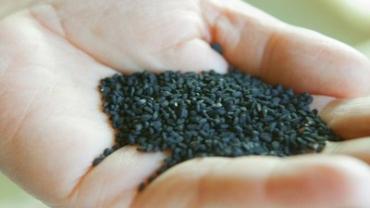
The kitchen spice rack sometimes proves as powerful as the bathroom medicine chest. From the anti-inflammatory properties of turmeric and ginger to the antioxidant effects of rosemary and oregano it’s a win-win when herbs and spices that enhance a meal’s flavor also bring with them beneficial effects for health. A new kid on the block to be added to the category of highly effective evidence-based botanical medicine is black cumin seed.
Don’t confuse black cumin (Nigella sativa) with the cumin more commonly used in the West particularly in Mexican and Tex-Mex cuisine (Cuminum cyminum). They come from different taxonomic families and the seeds have distinct appearances and flavor profiles. However like the cumin we are more familiar with black cumin is used as a spice in Middle Eastern and Western Asian cooking. It is particularly favored for addition to breads and pastries.
Black cumin is native to Southern Europe North Africa and Southwest Asia but it is now cultivated throughout the Mediterranean Middle East and Northern India. This spice which is little known in the West has been valued in the East for centuries and makes regular appearances in Ayurvedic medicine where it is considered something of a miracle seed having beneficial effects across a wide spectrum of conditions. Modern scientific research has corroborated many of the traditional uses of this tiny black seed particularly for kidney liver and respiratory issues.
Black cumin seed oil’s primary active compound—thymoquinone (TQ)—has shown antioxidant and anti-inflammatory properties as well as anti-cancer and immuno-modulatory effects. The latter are the result of augmenting T-cell and natural killer cell activity. TQ has also been shown to protect liver and kidney cells from chemically induced damage possibly through effects on helping to recycle antioxidant enzymes. In animals experiencing ischemia/reperfusion TQ normalized levels of glutathione and lactate dehydrogenase. Other studies support the role of TQ in enhancing the activity of catalase glutathione peroxidase glutathione-S-transferase and superoxide dismutase.
TQ may be an especially helpful therapeutic adjunct for autoimmune allergic and inflammatory conditions. Compared to placebo supplementation with black cumin seed oil resulted in significant improvement in disease activity in patients with rheumatoid arthritis. The combination of TQ’s anti-inflammatory effects with its role as an antihistamine offers a two-pronged mechanism to alleviate symptoms of several respiratory disorders including bronchial asthma and allergic rhinitis. Furthermore isolated TQ and whole black cumin seed oil both act as inhibitors of the inflammatory mediators cyclooxygenase (COX) and 5-lipoxygenase (5-LOX). Animal models have shown that the intact oil has a greater effect on reduction of inflammatory eicosanoids and lipid peroxidation than TQ alone suggesting a synergistic effect for compounds in the whole oil rather than isolated TQ. Having been shown to be a natural COX inhibitor we have modern research backing up the use of black cumin as an analgesic in ancient medicine.
Regarding other autoimmune and inflammatory conditions animal models of multiple sclerosis and ulcerative colitis point to TQ as a compound that may be more effective than existing pharmaceutical drugs. TQ modulates T-cell activity ameliorates oxidative stress and reduces inflammation in these disorders. The role of TQ in facilitating sufficient levels of antioxidant-replenishing enzymes may be why black cumin seed oil exhibits efficacy across such a wide range of health concerns.
As if all that wasn’t enough one of the most promising therapeutic avenues for black cumin seed is in cancer treatment. Unlike many conventional chemotherapy drugs TQ has been shown in animal models to be anti-proliferative against certain cancers (breast lung colorectal pancreatic prostate and glioma/glioblastoma) while having only a limited influence on healthy cells.
TQ has shown anti-cancer properties via cell cycle arrest reduced angiogenesis and metastasis and activation of genes that regulate apoptosis. Researchers believe black cumin seed oil’s role in inhibiting 5-LOX may be partly responsible for the reduced proliferation and enhanced apoptosis demonstrated in several types of cancer. Combining conventional chemotherapy drugs with TQ seems to enhance the efficacy of the conventional treatments suggesting that black cumin seed oil could be a useful addition to standard cancer therapies. TQ has been shown to augment the cytotoxic effects of cisplatin gemcitabine paclitaxel and doxorubicin.
Not bad for such a small seed!